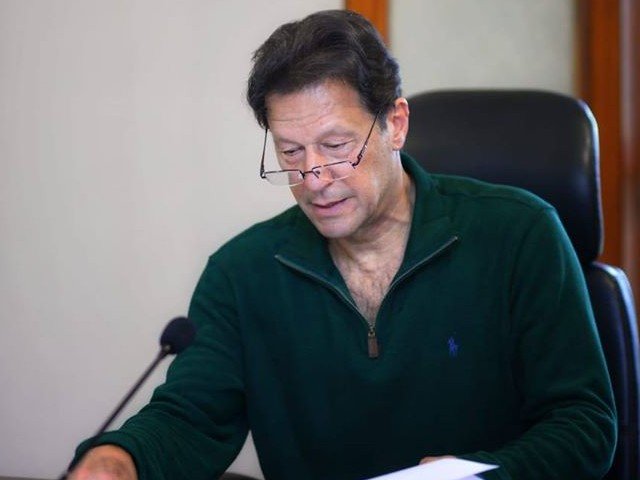
PM Imran directs for strict implementation of smart lockdowns
Imran Khan calls for preparations of SOPs consultation with the provincial governments
ISLAMABAD: Prime Minister Imran Khan on Monday directed the relevant authorities to ensure implementation of the smart lockdown strategy by involving of local community leaders as well as the volunteers of the Tiger Force.
Chairing a review meeting on the pandemic situation, the prime minister also directed for finalisation of the standard operating procedures (SOPs) for Eidul Azha in consultation with the provincial governments as soon as possible.
“This time, Eidul Azha will be being celebrated under extraordinary circumstances. The current situation demands that clear SOPs should be formulated as soon as possible for the protection of the people and their strict implementation be ensured,” the prime minister said.
Imran said that implementation of the smart lockdown strategy must be ensured. He directed for involving of local leaders and the communities. He also called for seeking help from the Tiger Force to create public awareness about the lockdowns and their implementation.
The meeting discussed the overall pandemic situation, increase in the number of oxygenated beds in hospitals, demand and supply of oxygen, implementation of smart lockdown in affected areas and the arrangements for Eidul Azha.
PM Imran predicts June, July as difficult months for Pakistan
On the occasion, the prime minister was briefed about the efforts being made to increase the number of beds reserved for Covid-19 patients in the hospitals in all the four provinces, Azad Jammu and Kashmir and Gilgit-Baltistan.
National Disaster Management Authority (NDMA) Chairman Lt Gen Muhammad Afzal briefed the meeting about the supply of beds to the various hospitals in Punjab, Sindh, Khyber Pakhtunkhwa, Balochistan and Islamabad. He added the beds capacity would be increased by 2,150 beds by mid-July.
The meeting also took stock of the steps being taken to meet the oxygen requirements and the implementation of smart lockdown in the identified hotspots in major cities of the country. The prime minister expressed satisfaction over the steps being taken to meet the needs of beds and oxygen.
He said that keeping in view the regional and international experience, it had become clear that the strategy adopted by the government for the prevention of coronavirus spread had yielded better results.
The meeting was attended by Information Minister Shibli Faraz, Interior Minister Ijaz Shah, Planning Minister Asad Umar, Economic Affairs Minister Khusro Bakhtiar, Industry Minister Hamad Azhar, Food Security Minister Fakhr Imam and Special Assistant for Health Dr Zafar Mirza, Special Assistant for Information Lt-Gen (retd) Asim Saleem Bajwa, Special Assistant Dr Shahbaz Gill, Special Assistant Dr Moeed Yousaf, Focal Person for Covid Dr Faisal Sultan, NDMA Chairman Lt Gen. Muhammad Afzal and other senior officers.
Authorities have imposed 549 smart and targeted lockdowns in areas where maximum coronavirus patients have been reported, confining 9,093,818 people, according to the National Command and Operation Centre (NCOC). The purpose of the lockdowns is to contain the risk of coronavirus spread.
According to the NCOC, in Punjab around 184 targeted lockdowns were imposed, where around 2 million population was restricted. In Sindh, 68 locations were under smart lockdown, where 4,951,000 people were restricted.
In Khyber Pakhtunkhwa, 232 smart lockdowns were imposed, restricting 534,110 people. In Azad Jammu and Kashmir (AJK), four districts were under a complete locking which 40 locations were under smart lockdown, confining 1,502,548 people.
In Islamabad, as many as 10 smart lockdowns were imposed whereas 90,000 people were restricted and In Gilgit-Baltistan, around 16 locations were under smart lockdown with 16,160 people placed under restrictions.
Earlier, a meeting of the NCOC, with Planning Minister Asad Umar in the chair, reviewed the targeted lockdown situation, need assessment of oxygen, epidemic (Epi) curve data and the update on the Resource Management System (RMS) and Pak Nigehban App.
Umar told the meeting that the aim of the targeted lockdowns was to isolate maximum Covid infected cases instead of merely restricting huge number of people. He observed that there was a positive difference seen in the urban areas with maximum compliance of wearing masks at public places.
The additional Punjab chief secretary briefed the forum that Lahore had the largest number of Covid cases for the past many days. He added that a provincial cabinet committee was going to devise the future course of action, keeping in view the new hotspots.
The K-P chief secretary informed the forum that there was no administrative challenge faced yet in imposing smart lockdown. The Sindh chief secretary highlighted an under-consideration suggestion to expand smart lockdown to further hotspot areas.
The Sindh chief secretary told the forum that the notification had been issued for barring the corporate sector from taking any punitive action against the employees residing in smart lockdown areas for not attending to offices.
The Balochistan chief secretary informed the forum that the strategy and deployment plan for smart lockdown had been prepared. He added the smart lockdown would be imposed for one and a half month.
The AJK chief secretary informed the forum that four districts were under complete lockdown. The Gilgit-Baltistan chief secretary mentioned that the decentralisation strategy was successful as the deputy commissioners in their relevant districts had efficiently contained the risk of outbreak.



1730547935-0/Untitled-design-(5)1730547935-0-270x192.webp)

1730544105-0/Untitled-design-(87)1730544105-0-270x192.webp)









COMMENTS
Comments are moderated and generally will be posted if they are on-topic and not abusive.
For more information, please see our Comments FAQ